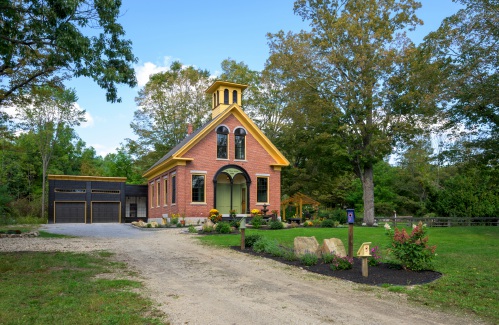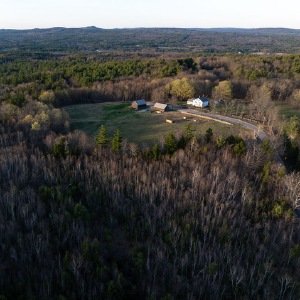
Photos: A Downtown ‘I Do’ at Market Days in Concord
Surrounded by their families, friends and scores of Market Days well-wishers, Cady Hickman and Cameron Green tied the knot in front of the State House on Friday evening.

Around Concord: Living in an 1856 schoolhouse is (mostly) delightful
Creating a home out of a very old building that was never a home before is a lot of fun. Mostly.
Most Read
 ‘Deep flavor’ – New restaurant in downtown Concord offers creative spin on comfort food and cocktails
‘Deep flavor’ – New restaurant in downtown Concord offers creative spin on comfort food and cocktails
 ‘Over-regulation is going to create sneakier kids’: Concord High students react to impending bell-to-bell phone ban
‘Over-regulation is going to create sneakier kids’: Concord High students react to impending bell-to-bell phone ban
 Photos: A Downtown ‘I Do’ at Market Days in Concord
Photos: A Downtown ‘I Do’ at Market Days in Concord
 Kenney family of Boscawen earns state preservation award for restoration of 19th-century barn
Kenney family of Boscawen earns state preservation award for restoration of 19th-century barn
 Concord receives federal funding to clean old stables, paving way for stagecoach museum
Concord receives federal funding to clean old stables, paving way for stagecoach museum
 Concord-area runners tackle Mt. Washington Road Race
Concord-area runners tackle Mt. Washington Road Race
Editors Picks
 A Webster property was sold for unpaid taxes in 2021. Now, the former owner wants his money back
A Webster property was sold for unpaid taxes in 2021. Now, the former owner wants his money back
 Report to Readers: Your support helps us produce impactful reporting
Report to Readers: Your support helps us produce impactful reporting
 City prepares to clear, clean longstanding encampments in Healy Park
City prepares to clear, clean longstanding encampments in Healy Park
 Productive or poisonous? Yearslong clubhouse fight ends with council approval
Productive or poisonous? Yearslong clubhouse fight ends with council approval
Sports

Athlete of the Week: Nate Kiah, Bow Falcons
Bow High School senior pitcher Nate Kiah had a stellar season on the mound and was a part of many deep playoff runs during his varsity career.
Opinion

Opinion: The art of diplomacy
 Opinion: After Roe: Three years of resistance, care and community
Opinion: After Roe: Three years of resistance, care and community
 Opinion: Iran and Gaza: A U.S. foreign policy of barbarism
Opinion: Iran and Gaza: A U.S. foreign policy of barbarism
 Opinion: There’s no place like firearms-free zones
Opinion: There’s no place like firearms-free zones
 Opinion: Outlines of a new dystopia
Opinion: Outlines of a new dystopia

Your Daily Puzzles

An approachable redesign to a classic. Explore our "hints."

A quick daily flip. Finally, someone cracked the code on digital jigsaw puzzles.

Chess but with chaos: Every day is a unique, wacky board.

Word search but as a strategy game. Clearing the board feels really good.

Align the letters in just the right way to spell a word. And then more words.
Politics

New Hampshire school phone ban could be among strictest in the country
When Gov. Kelly Ayotte called on the state legislature to pass a school phone ban in January, the pivotal question wasn’t whether the widely popular policy would pass but how far it would go.
 Sununu decides he won’t run for Senate despite praise from Trump
Sununu decides he won’t run for Senate despite praise from Trump
Arts & Life

Meet Moriah Billups, Young Professional of the Year
Moriah Billups has been named the Young Professional of the Year by the Greater Concord Chamber of Commerce. Billups, 32, currently lives in Hooksett and works at Concord Hospital Trust as a philanthropy office. She was honored at the Chamber’s Pinnacle Awards in early June and previously was named Young Professional of the Month in February 2023.
 Artist spotlight: Leah Kuehne
Artist spotlight: Leah Kuehne
Obituaries
 Victoria Cronin
Victoria Cronin
Center Harbor, NH - Victoria Anne Cronin, 72, of Center Harbor died peacefully in her home on June 20, 2025 after a brief illness. Born in Louisville, KY to Daniel W. Cronin and Norma Lee Cronin (McGuffin). For 13 years prior to moving ... remainder of obit for Victoria Cronin
 Shirley Nemiccolo
Shirley Nemiccolo
Bow, NH - Shirley May (Headberg) Nemiccolo, (94) a long time resident of Bow, NH and more recently a resident at the Merrimack County Nursing Home, passed away peacefully surrounded by her family. Shirley was predeceased by her loving h... remainder of obit for Shirley Nemiccolo
 Edward Francis Mullen Jr.
Edward Francis Mullen Jr.
Concord, NH - Edward Francis Mullen Jr., a beloved husband, father, grandfather, veteran, athlete, and community leader, passed away peacefully on Tuesday, June 24, 2025. He was 85. Born in Providence, Rhode Island, on April 7, 1940, t... remainder of obit for Edward Francis Mullen Jr.
 Elaine Merchant
Elaine Merchant
Elaine (Lillios) Merchant Concord, NH - Elaine (Lillios) Merchant, 79, of Concord, passed away unexpectedly at home on June 19, 2025. She was born in Torrington, CT, on August 19, 1945, to her late parents, her father Spiro Lillios and h... remainder of obit for Elaine Merchant


 Society for the Protection of New Hampshire Forests secures 200th property with 280-acre addition in Farmington
Society for the Protection of New Hampshire Forests secures 200th property with 280-acre addition in Farmington
 ‘It’s been very gratifying’ – Concord cyclist Bob Sanders rides 4,000 miles to denounce war in Gaza
‘It’s been very gratifying’ – Concord cyclist Bob Sanders rides 4,000 miles to denounce war in Gaza
 New Casella trash contract could hike Bow’s costs 42%
New Casella trash contract could hike Bow’s costs 42%
 Concord transitional housing facility offers gardening to improve mental wellness
Concord transitional housing facility offers gardening to improve mental wellness
 Concord crime rates fall below pre-pandemic levels
Concord crime rates fall below pre-pandemic levels
 The Rebel Collective to perform in Henniker
The Rebel Collective to perform in Henniker
 Lawmakers reach deal on $16 billion two-year budget
Lawmakers reach deal on $16 billion two-year budget
 Concord school leaders grapple with lunch debt exceeding $100,000
Concord school leaders grapple with lunch debt exceeding $100,000

 Track & field: Hopkinton’s Lane wins New England title in 3,200 meters, Concord’s Saysaw runs state record times in 100 and 200
Track & field: Hopkinton’s Lane wins New England title in 3,200 meters, Concord’s Saysaw runs state record times in 100 and 200 Boys’ Lacrosse: Bears narrowly lose to Plymouth in D-III championship, 7-5
Boys’ Lacrosse: Bears narrowly lose to Plymouth in D-III championship, 7-5 Boys’ volleyball: Coe-Brown wins program’s first championship, completes perfect season
Boys’ volleyball: Coe-Brown wins program’s first championship, completes perfect season Baseball: John Stark falls in D-II championship to top-ranked Souhegan
Baseball: John Stark falls in D-II championship to top-ranked Souhegan Concord became a Housing Champion. Now, state lawmakers could eliminate the funding.
Concord became a Housing Champion. Now, state lawmakers could eliminate the funding. ‘A wild accusation’: House votes to nix Child Advocate after Rep. suggests legislative interference
‘A wild accusation’: House votes to nix Child Advocate after Rep. suggests legislative interference  Town elections offer preview of citizenship voting rules being considered nationwide
Town elections offer preview of citizenship voting rules being considered nationwide “A Time to Gather Stones,” based on a local historical crime, premieres in Pittsfield
“A Time to Gather Stones,” based on a local historical crime, premieres in Pittsfield Making music: Contoocook-raised Derek Astles celebrates new album, old collaborations
Making music: Contoocook-raised Derek Astles celebrates new album, old collaborations 2025 Brodsky Prize for Excellence in Student Journalism awarded to Londonderry junior
2025 Brodsky Prize for Excellence in Student Journalism awarded to Londonderry junior 
